 Shael Riley is the geek rock Woody Allen.
Shael Riley is the geek rock Woody Allen.Think about it; his music, and indeed his very artistic voice, speaks volumes about love, sex, the folly of the human experience and one man's life in Gotham. But, just like Allen, this isn't the true source of his unique brand of genius. In both cases that has more to do with a knack for properly quantifying relatable elements as part of a greater whole: rationing out tiny bits of truth amid a grander scheme of the unbelievable and genuinely entertaining fictional narrative.
Just as Allen's early work is often characterized by zany comedies, Shael's back catalog is heavily slanted toward what I have personally referred to as "all-purpose absurdist nerd rock." Yet beneath these outlandish stories, there exists an almost uncomfortable sliver of universal truth. Because whether it's Annie Hall or "Heart Tits," everyone has found themselves in a relationship that just isn't going to work.
Shael's newest album with his band The Double Ice Backfire takes this songwriting style in an exciting new direction. It plays with the aural palette of the instrumental backing by combining driving guitars and chippy percussion in a way not unlike fellow hybrid poppers I Fight Dragons. But lyrically, it sees Shael's traditional slant on relatable absurdity climb to amazing heights.
- "Publishing Rights"
Like a lot of Shael's work, "Publishing Rights" is rowdy, sex-obsessed and a little misogynistic. Oddly enough, these are the characteristics of many of his best offerings, and this is no exception. Part rock 'n' roll fantasy, part MTV nightmare, it's a chip-rock masterpiece that's solidly about control and who has it. Schaffer the Darklord makes an unexpected appearance as the shadiest of shady dealers, and comes strapped with his trademark verbal sneer. For those who haven't heard a Shael Riley track since Toybox, this one likely displays a notable leap forward in both songwriting style and vocal delivery, but those of us who've been paying attention will likely find it more an incremental tweak on his Grammar Club-era output. - "How to Fire a Gun"
Heartfelt and interestingly layered, "How to Fire a Gun" is an unassuming joint with a great big chorus. It contains a grocery list of idle wants that seem to belie the song's underlying sense of lost opportunity. To fire a gun it to be safe. To be a doctor or a lawyer is to be respected. To understand technology is to be in control of one's future. And yet our narrator has none of these skills, feels none of these strengths. It's a soul-crushingly beautiful ditty that, oddly enough, can "make you re-assess your life." - "The Other Side of Memphis"
I can't help but think that "The Other Side of Memphis" was, at some point, this album's opener. It has a sweet lead-in and a perfectly interlocking guitar and percussion line that makes for instant pop perfection. (Taken to even further by the flawless bridge-to-solo movement.) Sadly, we never truly learn the nature of our protagonist's – Shael? Blane? Duckie? – true fascination with Andie Walsh. As such, this one seems to come off as a love song about the idea of romance, as opposed to its (im)practical application. EDIT: It's just been brought to my attention that The Double Ice Backfire's Ricky Henry wrote the lyrics and chord progression for this track. Ricky speaks his piece about the song (and the recent passing of John Hughes) in this blog post. - "Asian Kids Have All the Best Moves"
Shael marks the album's mid-point by emerging from a stylistic cocoon as some hybrid of Jason Mraz and Frank Zappa, speak-singing a song that sounds both uniquely personal and wholly surreal. Lyrically impeccable, neurotically uncomfortable and musically thrilling, Shael, Ty and Ricky manage to craft that rare piece that's hard to describe but a joy to experience. The standout track among an offering of surgically precise thrillers, "Asian Kids" may well be Shael's best song to date. Both the functional and artistic center of Songs from the Pit, this one proves an amazing focal point that affords a further relevance to the album as a whole. - "Hipster Hoax"
Some songs hit painfully close to home for the same reason that some stories make us reflect on our own experiences: because they shout our personal truths from the mountaintop. They tell our secrets. "Hipster Hoax" will likely strike a similar chord with anyone reading these words. Anyone who's a natural outsider. Anyone who's suddenly found themselves confronted by some twisted mirror image compliments of the present "geek chic." Anyone who understands irony as a literary device as opposed to a way of life. The music skillfully plays peek-a-boo with its lyrical weight, which only serves to add an additional layer of thematic exasperation. Well played, boys. Sure, maybe I don't feel the coda, but that doesn't diminish the rest of this song's considerable power. - "Chinese Ninja Warrior"
If Songs from the Pit has a weak point, it's "Chinese Ninja Warrior." That's not to say that the song is in any way bad; it simply pales a bit next to the project's other offerings. A lighthearted, movie soundtrack-style introduction to Mortal Kombat's Sub-Zero – and a cover, at that – is exactly the kind of musical madness upon which Shael has built his church, but in context it comes off a little thin. Still, it's an enjoyable romp resplendent with churning guitars, high-register vibrato and a delicate chippy fade-out. It's an interesting diversion. - "tip eht fo mottob"
An unexpected bit of electro-funk permeates what could laughably be called the title track. It boasts a groove the likes of which we have yet to hear on the album, and one that is not expressly indicative of the work of frontman Shael Riley in the slightest. This combined with some tightly compressed instrumentation and understated vocals makes for yet another amazing song. With lyrics that read like the plot of some sadistic videogame and a warbling rhythm that can't help but make your head bob, "tip eht fo mottob" has an almost ska-core upbeat and sea-shanty delivery that makes it play like a twisted offspring of The Specials' "Ghost Town." - "Asian Kids Have All the Best Moves (solo piano)"
Somehow this song sounds even more earnest when cast against a stripped-down piano. With its beautifully rendered suburban malaise, it's an ample restatement of purpose for Songs from the Pit. The resonance of its terse last note is both consciously and emotionally staggering.
And while I was on-point with my assumption that Songs from the Pit would be an intriguing and well-crafted musical experience, I can't help but feel as though Shael mislead me a bit. What he and the inexplicably named Double Ice Backfire produced is much more tonic to post-grunge; it's more Weezer than Pearl Jam.
Still, even if it lacks grunge earmarks like sloppy, trudging guitars and ill-timed transitions, it certainly hits close to its established themes. In fact, one could even view Songs from the Pit as a veritable concept album steeped in the idea of angst, alienation and the lower middle-class identity crisis.
It's that sense of desperately grappling for identity and success that energizes songs from "Publishing Rights" to "Asian Kids Have all the Best Moves." It's the anxiety that plagues the narrator of "Hipster Hoax." It could even be said that it's what drives the blissful escapism of "Chinese Ninja Warrior." But perhaps that's just me insinuating my own life experience into Shael's skillful narrative.
You see, while Songs from the Pit is first and foremost an undeniably pleasing musical journey, it also leaves itself open for subjective interpretation. If that's your thing. If not, then simply enjoy the album for its myriad of musical merits.
Either way, I feel confident you'll be amused (and intrigued) by what you hear.
"You can pretend that you're something you like. When you're poor and white."




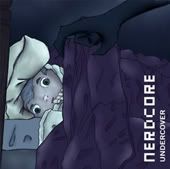
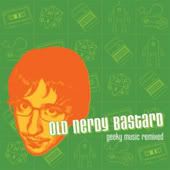
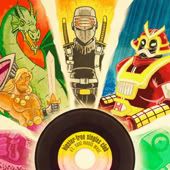
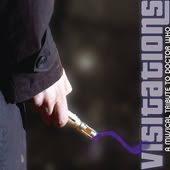
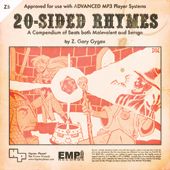
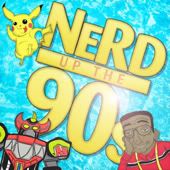







7 comments:
I must say that Hipster Hoax hits home for me as well. I think it is a wonderfully crafted song about something some of us nerdy types seem to shy away from and not acknowledge though it seems in our own minds we can feel and know that hipster hoax is dead on.
Shael better have put one aside for me... Can't wait to hear it. Especially on cassette. Gotta go to Walgreens and get some of those stupid cheap headphones with the big ear foams on them a la "American Psycho" to complete the package. Can't wait.
I hope this will be available digitally at some point - I'm burning to hear it but I don't even know if I have a cassette player anymore.
Im am a Robot!
I have no tape player
Im going to get this anyways.
Too true, Ant. "Hipster Hoax" is inspired.
You're in for a treat, Mr. Trust me.
Word is that the material will be available in other forms at a later date, But Songs from the Pit itself will remain cassette only, Dave.
Um... thanks, bot. :/
We'll chip in a buy you an old style Walkman, ks. Even a robot can't resist that shit. ;)
Sorry, Im not the robot, Lixue was. I am mostly Irish and Scottish.
"I recently came accross your blog and have been reading along. I thought I would leave my first comment. I dont know what to say except that I have enjoyed reading. Nice blog. I will keep visiting this blog very often.
Susan
http://disturbialyrics.net"
I ordered mine, and think i know someone with a tape machine... Its definitely getting on the ipod. The tracks played at NAP were great.
I still lament missing Shael and Beefy at 'Palooza. :(
Post a Comment